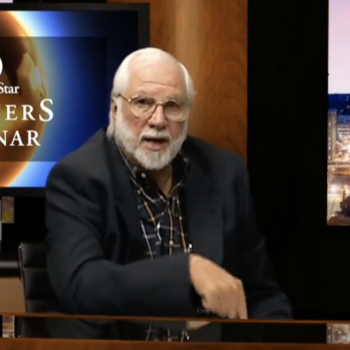The New York Times‘ Nicholas Kristof has always been an apologist for religious belief.

The validity (or lack) of faith has never concerned him. His argument has always been that good Christians exist, therefore religion is good. Bad believers are always the exceptions to the rule, and their awfulness always occurs despite their faith, not because of it.
He continued that flawed line of reasoning over the weekend when reacting to a new poll that found Christianity is in “rapid” decline while the number of non-religious Americans was still growing.
Kristof blames this trend (as if it’s a bad thing) on the likes of Jerry Falwell and Pat Robertson. He says they’re the reasons we’re “less and less a Christian Nation” (as if that’s something we should all want).
… a far bigger threat to the “brand” of Christianity comes, I think, from religious blowhards who have entangled faith with bigotry, sexism, homophobia and xenophobia. For some young people, Christianity is associated less with love than with hate.
He’s right about that last part and wrong about everything else.
One problem with his argument here is that a lot of “good” Christians hold the same bigoted, homophobic views as the blowhards. More than half of evangelical Christians say homosexuality ought to be “discouraged,” and the answer is arguably larger among pastors. Even someone like Pastor Rick Warren, hardly a blowhard, opposes marriage equality.
Don’t blame the extremists when the rank and file believe the same damn thing, but more quietly. Just because bigotry is lower on their list of priorities doesn’t mean it’s not on the list at all.
Here’s where Kristof really goes off the rails. When citing some undoubtedly incredible people who were inspired by their faith to do good, he writes,
… If they were the face of Christianity, its reputation would be golden. Likewise, Christian organizations like International Justice Mission, Mercy Ships, Catholic Relief Services and World Vision labor to make the world a better place. Across America, a crucial safety net comes from churches organizing food pantries and emergency shelters.
Sure, the reputation of Christianity might be better in that case, but Kristof misses the larger picture.
He assumes people are escaping Christianity because they want no association with the worst members of the flock. That’s an insult to anyone who’s ever left religion because they looked at it, studied it, and realized it just wasn’t true. The problem isn’t a bad apple or two. The problem is the orchard. And over the past decade, non-religious people have used modern tools of communication to spread those ideas and help people realize they’re not alone.
I’ve said this before, but Google has arguably created more atheists than all the Robertsons and Falwells of the world.
No doubt televangelists, abusive priests, Republican theocrats, and the likes of Westboro Baptist Church have jolted people out of the notion that faith is a virtue, but even if the only Christians we ever heard about were the exemplary ones, it wouldn’t make the Jesus myth any more believable. They’d still be doing the right things for the wrong reasons.
To say that people aren’t Christian because we only ever hear about the worst Christians is such a superficial view of how Secular Americans think about religion. Kristof has always done a good job of telling the stories of people of faith. Apparently, he can’t bring himself to talk to young people about why they want nothing to do with organized religion.
(Image via Shutterstock)




It’s Moving Day for the Friendly ..."
It’s Moving Day for the Friendly ..."
It’s Moving Day for the Friendly ..."
It’s Moving Day for the Friendly ..."